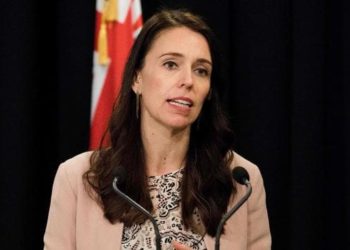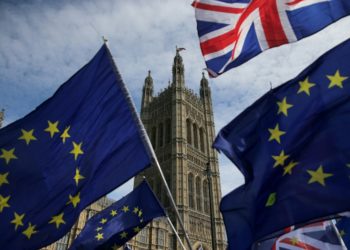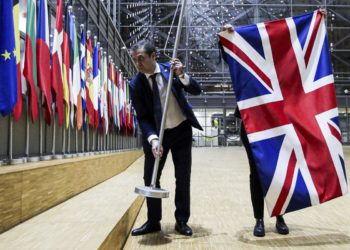Since voters in the United Kingdom voted to leave the European Union in 2016, Brexit has dominated the national political discourse.
With campaigning underway for a general election that will take place on December 12, Brexit is once again the center of attention and major parties like the Conservatives, the Liberal Democrats, and the aptly named Brexit Party are centering their campaigns on the key issue.
The U.K.’s left-wing Labour Party, on the other hand, is taking a chance by focusing on its broader economic agenda that extends well beyond the confines of the Brexit debate.
How the U.K. Got Here
In April of 2017, almost a year after the U.K. voted to leave the E.U., then-Prime Minister Theresa May of the Conservative Party called a snap election.
With the “Tories” (as members of the Conservative Party are often referred to) holding a commanding lead in the polls, the snap election was a bid that appeared all but certain to expand May’s parliamentary majority and secure a mandate for her Brexit deal.
“Theresa May took a look at her poll ratings, which were very high indeed … and she decided that she would be able to one, impose a bit more discipline in her own party and two, completely obliterate Labour if she called a snap general election,” Ash Sarkar, a contributing editor for Novara Media, told The Globe Post.
In June after the dust of the election settled, it was clear that May’s plan had failed. Rather than expand her majority, she lost it and the result was a hung parliament with a now weakened coalition government between Conservatives and the Democratic Unionist Party of Northern Ireland.
Another effect of the snap election was an emboldened opposition in the Labour Party, which gained 30 seats, defying the predictions of a resounding defeat for the relatively new Labour leader, Jeremy Corbyn.
The 2017 election threw a wrench into the Brexit process. Proposed arrangements negotiated with the E.U. have since failed in Parliament three times and the scheduled exit date has been delayed on multiple occasions.
“[May] put forward a deal which was a pretty decent compromise between the moderates and the hardliners in her own party, but it wasn’t to compromise for the House of Commons and it couldn’t bring the Labour Party onboard,” Sarkar said.
“The hard-line Brexiteers could sense blood in the water, so they blocked her at every turn until she had to stand down.”
In the spring of 2019, a tearful May announced she would resign as prime minister, paving the way for the new Conservative Party Leader Boris Johnson to take up the mantle in July.
In the months since Johnson’s premiership began, Brexit negotiations have continued to go nowhere fast against an ever-looming October 31 deadline. By late October, with no sign of progress, Johnson was forced to ask the E.U. for a three-month extension of the Brexit deadline and called for another snap election to take place on December 12.
“[Johnson] had to, by law, go back to the European Union and request an extension, which he did begrudgingly, and the E.U. agreed to an extension to the thirty first of January 2020,” James Crimmins, a professor of political science at Huron University College in Canada, told The Globe Post.
“He decided that the only way he could get his deal through now was to get a majority in parliament and that meant a general election.”
Drawing the Battle Lines
With an election less than six weeks away, the four major parties, Conservatives, Labour, Liberal Democrats, and the Brexit Party, are shifting to a campaign posture and making their case to voters.
An aggregation of polls by The Guardian currently shows the Tories in front with 39 percent support followed by Labour with 27 percent and Liberal Democrats and Brexit at 16 and 9 percent respectively.
“At first glance, it looks like the Conservatives have what you would expect to be a fairly substantial lead in the seat count over Labour,” Crimmins said. “There’s no question that based on those polling numbers, they will win more seats than Labour.”
If Labour is to have any hope of holding their current seats or even winning a majority or plurality in Parliament, it will have to be through replicating the surge in support they experienced in the weeks before the 2017 election.
We have a once-in-a-generation chance to rebuild and transform our country.
It’s time for real change.
We’re ready. Are you with us?#GeneralElection2019 pic.twitter.com/kF0K7St6fb
— The Labour Party (@UKLabour) October 29, 2019
According to Sarkar, one reason that could happen again is broadcast impartiality rules that kick in during elections in the U.K.
“Civil servants have to be absolutely, impeccably impartial,” Sarkar said, explaining that television and radio programs are regulated by a government agency called Ofcom.
Sarkar believes these rules benefit Labour because it minimizes what would otherwise be overwhelmingly negative coverage of Corbyn and the Labour Party.
“Even though British broadcasting is nowhere near as partisan as it is in the United States, it’s still pretty bad,” Sarkar said. “Impartial broadcasting rules make a difference because it’s not actually favoring Jeremy Corbyn. It’s just telling the truth about him.”
Another strength for Labour, according to Sarkar, is the party’s capacity for grassroots mobilization of its membership.
“You’ve got hundreds and hundreds of people turning out in single constituencies. So last week, you had thousands of people organized by Momentum and by Labour. Not all of these people are members, but just supporters of the left out there canvassing for candidates in once-safe Tory seats.”
Based on the various party websites and campaign literature, it’s clear Brexit will continue to be a top-line issue. “Back Boris. Get Brexit Done,” reads one Conservative Party slogan. “Stop Brexit. Build a brighter future,” Reads a slogan of the Liberal Democrats, led by Jo Swinson. The Brexit Party under the leadership of Nigel Farage, calls for a “real” Brexit, implying Boris Johnson’s vision for leaving the E.U. doesn’t go far enough.
Visit the Labour Party’s website, on the other hand, and you won’t see a single mention of Brexit until almost halfway down the page. Instead, the Labor Party is emphasizing what they see as a need for “real change.”
“The top line is real change,” Sarkar said.
“What Labour is saying is that not only is there going to be a very robust social democratic offer of strengthening the social safety net, ending austerity, and reversing the harsh cuts to public services, there’s also going to be a process of quite a radical reorganization of society. So that’s their big offer, which is real change, which puts money in your pocket and puts you back in control of your life.”
But the Labour Party’s choice to downplay Brexit in their campaign has also been a key point of criticism for some, like Diarmaid Macculloch, a professor of the History of the Church at Oxford University.
“I’m looking forward to meeting a Labour Party canvasser on my front door asking him – ‘well, is your party with remain or leave? Yes or no?’ – and they will just unhappily try and get out of that question,” Macculloch told The Globe Post.
“They just need to be pinned down. Yes or no? Remain or leave? At least it seems the Tories are consistent now apart from one or two brave old souls.”
For his part, Corbyn has argued that Labour’s Brexit policy is actually quite simple.
“Secure a credible deal in three months. Put it to the people for the final say, with the option to remain, in six months. That’s our Brexit policy,” he tweeted last week.
But the issue remains a key divide between Corbyn’s Labour Party and Swinson’s Lib Dems, who are strongly in the remain camp and have taken a more moderate tack compared to Labour on economic policy.
“The Lib Dems have decided to turn themselves into the ‘remain’ mirror image of the Brexit Party,” Sarkar said.
“But the other main contrast is that the Lib Dems and Jo Swinson, in particular, have a real ideological opposition to the left. The core of the Labour economic offer in terms of shifting power away from the wealthy and towards working-class people is fundamentally anathema to what Jo Swinson wants.”
Beyond Brexit
While Corbyn’s stance on Brexit may frustrate ardent remainers, it’s par for the course for a Labour leader who has a long and storied history of prioritizing a radical, grassroots progressive agenda. Unlike the other major parties which are mainly focused on their contrasting visions on the Brexit issue, the Labour Party is wagering that a campaign that highlights their broader economic agenda is their path to victory in December.
For example, Corbyn is promising to aggressively tackle the climate crisis, in part by setting more ambitious benchmarks for emissions reductions. Labour also promises to address both the climate and housing crises at the same time by requiring all new homes to be zero carbon within three years and upgrading 27 million existing homes to be more energy-efficient.
Our NHS is not for sale. pic.twitter.com/hgh3S5wMVR
— Jeremy Corbyn (@jeremycorbyn) November 9, 2019
The climate crisis is a growing concern among voters in the U.K. and especially among those under 25, according to a new survey from Client Earth. The organization found 54 percent of U.K. voters say climate change will greatly influence how they vote, including 74 percent of young people. Furthermore, 63 percent of all Britons surveyed and 70 percent of those under 25 said politicians are not talking enough about the climate crisis leading up to the election.
“Normally in a general election, climate change is well down the list of voters concerns, but the last few years have seen in the U.K. an extraordinary rise in concern about the issue,” Dave Timms, the head of political affairs at Friends of the Earth, told The Globe Post. “This especially corresponds with the wave of young people taking to the streets and often striking from school.”
Timms also noted the Lib Dems recently pledged to upgrade the energy efficiency of every home in Britain by 2030 and the Conservative party government put a moratorium on fracking in the U.K. earlier this month. Just three days after halting fracking, however, the government released a document which leaves the door open to future shale gas drilling projects.
“We’ve not heard of any climate solutions from the Brexit party at all,” Timms said.
As for Labour, Timms said the party’s energy efficiency proposals are “great” but that “they still have a real blind spot where it comes to the consequences of expanding aviation.”
“We really need to see parties facing up to the fact that we cannot continue to expand aviation if we want to meet all of all the existing obligations that we’ve got,” he said.
Britain’s National Health Service could also play an important role in the election, as Tory governments have privatized elements of the NHS and cut funding while the NHS has experienced worsening staff shortages.
“The NHS is an extraordinary thing. It is an extremely popular part of our national way of life and yet the Conservative Party hates it and wants to privatize it and sell off bits to American medical insurance companies,” McCullough said.
“They don’t say so, so they have to pretend that they are the greatest champions of the NHS alongside the Labour Party, which, of course, created the NHS back in the 1940s.”
According to Crimmins, a problem for the Conservatives is that while they’re promising to increase financial support, their record of austerity on the NHS over the last several years has lost them credibility with the public.
“While the Conservatives have been in power, they’ve done nothing but reduce the funding for the NHS,” he said. “There’s a degree of hypocrisy that surrounds this as far as Conservative statements about the National Health Service in relation to Labour. It is perhaps the one issue that the electorate does trust the Labour Party with.”























